Decision means Constitutionality of 'discriminatory' voting laws unlikely to be determined by Supremes before 2016 Presidential elections...
 A few weeks ago, our legal analyst Ernie Canning warned how the U.S. Supreme Court's pending decision on whether or not to hear the ACLU's challenge to the Wisconsin GOP Photo ID voting law might be the last chance before the 2016 Presidential elections to determine the Constitutionality of such laws.
A few weeks ago, our legal analyst Ernie Canning warned how the U.S. Supreme Court's pending decision on whether or not to hear the ACLU's challenge to the Wisconsin GOP Photo ID voting law might be the last chance before the 2016 Presidential elections to determine the Constitutionality of such laws.
On Monday, the Supreme Court decided not to grant cert in the WI challenge in the Frank v. Walker case. The decision is not a ruling on the merits of the case or the Constitutionality of the law. It simply means that, for now, there were not four votes on the Court to hear the ACLU's challenge at this time.
It also means that, barring further court action or a quick decision on a similar law out of another state, polling place Photo ID restrictions on voters will be allowed in the Badger State in 2016. That, despite the fact that the federal trial court found, when striking down the law as unconstitutional and a violation of Section 2 of the Voting Rights Act last year, that the new Republican-enacted law may serve to bar some 300,000 disproportionately Democratic-leaning and already lawfully registered voters from casting a ballot in the state's Presidential election.
There is also more than a bit of irony in this matter, in that, after U.S. District Court Judge Lynn Adelman soundly rejected the law in 2014 --- finding that "evidence adduced at trial demonstrates" WI's Act 23 "disproportionately impacts Black and Latino voters" and that the law would "prevent more legitimate votes from being cast than fraudulent votes" --- the 7th Circuit Court of Appeals deadlocked (disingenously) 5 to 5 on whether to stay the original ruling. That deadlock meant the stay would be granted and the WI law would be allowed, barring further court challenges, despite the fact that 6 federal judges had voted to strike down the law, while just 5 had voted in its favor. To make matters worse, Act 23 had also been struck down previously in state court as a violation of the state constitution as well. Nonetheless, in this matter, a minority of judges successfully ruled against the majority.
All of that, despite a blistering dissent filed in last year's 7th Circuit Court WI decision by against the law (and all such laws) from revered conservative 7th Court of Appeals Judge Richard Posner. Posner's original ruling in favor of a Photo ID restriction law in Crawford v. Marion County, Indiana, was the basis of the first such case to be heard by the U.S. Supreme Court, upholding Indiana's Photo ID law in 2008. So his unambiguous reversal on the issue, now that we know much more about such laws, was noteworthy and, opponents of the law had hoped, convincing to the Supremes who have, for many years, favorably cited the legal scholar's opinions.
Though the 7th Circuit's decision to temporarily stay the original ruling striking down the law was later vacated by the U.S. Supreme Court last year --- on the basis that the stay was made too close to the election --- the discriminatory law is now back in place in the state. The refusal by the Court to grant cert this weeks means that it will likely remain in place as the next Presidential election begins.
Some watching these matters closely, however, believe that Monday's decision by SCOTUS to not hear the Wisconsin case may ultimately be a good thing, perhaps "a blessing in disguise"...
--- Click here for REST OF STORY!... ---
 The call for the impeachment of U.S. District Court Judge Mark Fuller is now making its way onto the airwaves in a number of Congressional districts around the country.
The call for the impeachment of U.S. District Court Judge Mark Fuller is now making its way onto the airwaves in a number of Congressional districts around the country.

 The GOP 'Voter Fraud'
The GOP 'Voter Fraud' 'Green News Report' 10/31/24
'Green News Report' 10/31/24
 'Closing Arguments'
'Closing Arguments' Trump Promises to be a Lawless, Authoritarian President. Believe Him: 'BradCast' 10/29/24
Trump Promises to be a Lawless, Authoritarian President. Believe Him: 'BradCast' 10/29/24 'Green News Report' 10/29/24
'Green News Report' 10/29/24 Election Heats Up: Ballots Burn, Billionaires 'Obey in Advance', Callers Ring In: 'BradCast' 10/28/24
Election Heats Up: Ballots Burn, Billionaires 'Obey in Advance', Callers Ring In: 'BradCast' 10/28/24 Musk's Privatized Internet Satellite System Threatens U.S. National Security
Musk's Privatized Internet Satellite System Threatens U.S. National Security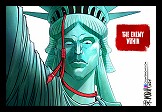 Sunday 'VOTE NOW!' Toons
Sunday 'VOTE NOW!' Toons Harris on Hope, Trump's Fasc-ism in Bumpy Closing Days: 'BradCast' 10/24/24
Harris on Hope, Trump's Fasc-ism in Bumpy Closing Days: 'BradCast' 10/24/24 'Green News Report' 10/24/24
'Green News Report' 10/24/24 Kelly on Trump: 'Fascist', Admires Hitler, Disrespects Constitution and Disabled Vets: 'BradCast' 10/23/24
Kelly on Trump: 'Fascist', Admires Hitler, Disrespects Constitution and Disabled Vets: 'BradCast' 10/23/24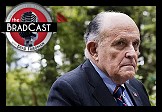 Accountability Comes For Rudy, Other Election Deniers: 'BradCast' 10/22/24
Accountability Comes For Rudy, Other Election Deniers: 'BradCast' 10/22/24 'Green News Report' 10/22/24
'Green News Report' 10/22/24 Elon Musk's 'Vote Buying' and Lying for Trump: 'BradCast' 10/21/24
Elon Musk's 'Vote Buying' and Lying for Trump: 'BradCast' 10/21/24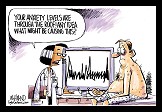 Sunday 'High Anxiety' Toons
Sunday 'High Anxiety' Toons 'Green News Report' 10/17/24
'Green News Report' 10/17/24 Fake v. Real Censorship and Trump/Fox Fetish-ized Grievance World: 'BradCast' 10/17/24
Fake v. Real Censorship and Trump/Fox Fetish-ized Grievance World: 'BradCast' 10/17/24 'Americans Aren't Prepared for Trump's Police State': 'BradCast' 10/16/24
'Americans Aren't Prepared for Trump's Police State': 'BradCast' 10/16/24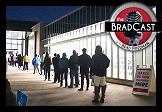 Good News for Georgia Voters, the Economy and Kamala Harris: 'BradCast' 10/15/24
Good News for Georgia Voters, the Economy and Kamala Harris: 'BradCast' 10/15/24 Fascism Comes to America: 'BradCast' 10/14/24
Fascism Comes to America: 'BradCast' 10/14/24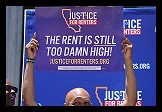 Institutional Landlords Flood CA Voters With Deceptive Ads on Props 33 and 34
Institutional Landlords Flood CA Voters With Deceptive Ads on Props 33 and 34 Milton's Mess, FL's U.S. House Liars, Trump's Made-in-China Bibles: 'BradCast' 10/10/24
Milton's Mess, FL's U.S. House Liars, Trump's Made-in-China Bibles: 'BradCast' 10/10/24 Whistleblower Org Readies to Support Election Officials: 'BradCast' 10/9/24
Whistleblower Org Readies to Support Election Officials: 'BradCast' 10/9/24 Florida Braces for 'Devastating to Catastrophic' Milton: 'BradCast' 10/8/24
Florida Braces for 'Devastating to Catastrophic' Milton: 'BradCast' 10/8/24
 VA GOP VOTER REG FRAUDSTER OFF HOOK
VA GOP VOTER REG FRAUDSTER OFF HOOK Criminal GOP Voter Registration Fraud Probe Expanding in VA
Criminal GOP Voter Registration Fraud Probe Expanding in VA DOJ PROBE SOUGHT AFTER VA ARREST
DOJ PROBE SOUGHT AFTER VA ARREST Arrest in VA: GOP Voter Reg Scandal Widens
Arrest in VA: GOP Voter Reg Scandal Widens ALL TOGETHER: ROVE, SPROUL, KOCHS, RNC
ALL TOGETHER: ROVE, SPROUL, KOCHS, RNC LATimes: RNC's 'Fired' Sproul Working for Repubs in 'as Many as 30 States'
LATimes: RNC's 'Fired' Sproul Working for Repubs in 'as Many as 30 States' 'Fired' Sproul Group 'Cloned', Still Working for Republicans in At Least 10 States
'Fired' Sproul Group 'Cloned', Still Working for Republicans in At Least 10 States FINALLY: FOX ON GOP REG FRAUD SCANDAL
FINALLY: FOX ON GOP REG FRAUD SCANDAL COLORADO FOLLOWS FLORIDA WITH GOP CRIMINAL INVESTIGATION
COLORADO FOLLOWS FLORIDA WITH GOP CRIMINAL INVESTIGATION CRIMINAL PROBE LAUNCHED INTO GOP VOTER REGISTRATION FRAUD SCANDAL IN FL
CRIMINAL PROBE LAUNCHED INTO GOP VOTER REGISTRATION FRAUD SCANDAL IN FL Brad Breaks PA Photo ID & GOP Registration Fraud Scandal News on Hartmann TV
Brad Breaks PA Photo ID & GOP Registration Fraud Scandal News on Hartmann TV  CAUGHT ON TAPE: COORDINATED NATIONWIDE GOP VOTER REG SCAM
CAUGHT ON TAPE: COORDINATED NATIONWIDE GOP VOTER REG SCAM CRIMINAL ELECTION FRAUD COMPLAINT FILED AGAINST GOP 'FRAUD' FIRM
CRIMINAL ELECTION FRAUD COMPLAINT FILED AGAINST GOP 'FRAUD' FIRM RICK SCOTT GETS ROLLED IN GOP REGISTRATION FRAUD SCANDAL
RICK SCOTT GETS ROLLED IN GOP REGISTRATION FRAUD SCANDAL VIDEO: Brad Breaks GOP Reg Fraud Scandal on Hartmann TV
VIDEO: Brad Breaks GOP Reg Fraud Scandal on Hartmann TV RNC FIRES NATIONAL VOTER REGISTRATION FIRM FOR FRAUD
RNC FIRES NATIONAL VOTER REGISTRATION FIRM FOR FRAUD EXCLUSIVE: Intvw w/ FL Official Who First Discovered GOP Reg Fraud
EXCLUSIVE: Intvw w/ FL Official Who First Discovered GOP Reg Fraud GOP REGISTRATION FRAUD FOUND IN FL
GOP REGISTRATION FRAUD FOUND IN FL



















 A few weeks ago, our legal analyst
A few weeks ago, our legal analyst  Another new Internet Voting system, another major vulnerability to massive election fraud discovered along with it. This time in Australia, as
Another new Internet Voting system, another major vulnerability to massive election fraud discovered along with it. This time in Australia, as  This weekend, Washington Monthly blogger (and too-occasional
This weekend, Washington Monthly blogger (and too-occasional 
 Out here in California --- for those of us now living directly "on the front edge of a climate crisis", as MSNBC's Chris Hayes describes it in the interview below --- it's both extraordinarily unusual and incredibly welcome to hear a politician with
Out here in California --- for those of us now living directly "on the front edge of a climate crisis", as MSNBC's Chris Hayes describes it in the interview below --- it's both extraordinarily unusual and incredibly welcome to hear a politician with 








 On this week's
On this week's  I am prepping for today's KPFK/Pacifica Radio
I am prepping for today's KPFK/Pacifica Radio  Oh, look! A glimmer of common sense rationality in an otherwise
Oh, look! A glimmer of common sense rationality in an otherwise 
 In a new
In a new 
 It's been a long long time. And
It's been a long long time. And 













